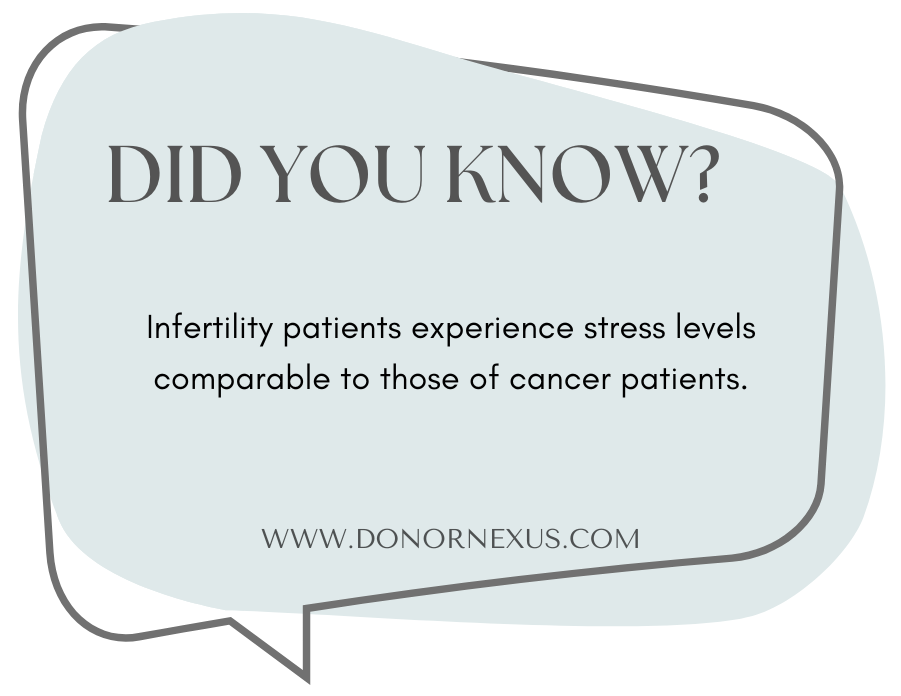Long-Term Strategies to Help Decrease the Stress of Infertility
Infertility can be an emotional rollercoaster, filled with highs and lows, hope and disappointment. It's a path that tests your mental, physical, and emotional resilience. Recognizing the depth of this challenge, we aim to offer you practical strategies to help manage stress throughout your journey with IVF and pregnancy, beyond the well-meaning but often unhelpful advice to "just relax."
1. Process Your Feelings - Find Support
Infertility grief is such a real thing, and it should be talked about more. If you feel deep sadness, anger, frustration, stress...you're not alone. There are online support groups with others who are on similar journeys, including others who have eventually had success with IVF, whether it was with their own eggs or through donor conception, or others who had different journeys. There are also many infertility counselors with expertise in the psychological aspects of infertility and can offer invaluable support and resources.
2. Mindfulness - Don't Underestimate the Power of Your Thoughts
While it's easier said than done, practicing mindfulness can help you control your thoughts to prevent them from spiraling into fear and anxiety. Focus on what is in your control, rather than what isn't. If you're contemplating using a donor egg, focus on the possibility of what you will be gaining instead of what you will be losing. Again, we know this is a huge perspective shift for some, which is why we have some great resources for you in point #4!
"You have two choices: to control your mind or to let your mind control you."
-Paulo Coelho
3. Meditation - Inner Peace for Sustained Stress Relief
One of the best ways to ‘turn off’ your mind is to go inward. According to the American Heart Association, meditation is a great way to help ease the mind and reduce heart rate and blood pressure naturally. To meditate, all you need is a quiet space and 10 to 20 minutes of your time. It is recommended to meditate daily in order to see long-term benefits. Meditating is about observing your thoughts and connecting to your breath. When a thought, feeling, or sensation enters the mind, we are quick to analyze and judge it. With meditation, you are accepting that thought, feeling, or sensation and allowing it to pass. If you start to react to it, you return your focus to your breathing.
According to Harvard Health Publications, taking long, slow deep breaths helps the brain disengage. This retrains the brain to redirect distracting thoughts. Some people like to add a mantra to their meditation practice. When the mind starts to wander, you can repeat the mantra as you reconnect with your breath. A mantra can be one word or a short statement. The mantra should be a positive statement that you want to manifest in your life. It is important to remember that meditating is a practice and over time you will notice it will become easier. For patients who are seeking fertility treatment and want to find a way to ease the stresses in their lives, it may be beneficial to add a meditation practice to your daily routine.
4. Take Advantage of Our Resources!
Donor Nexus offers a wealth of resources to support you through this journey. A great place to start is with our blog series written by infertility warrior Victoria Nino, including topics like "7 Ways I Learned to Cope With Infertility Grief" and "Embracing Donor Eggs While Grieving Your Genetics". Whether you've always known you would need to use donor eggs or if you've experienced several failed IVF cycles and are beginning to consider donor eggs, we encourage you to read through other firsthand experiences and success stories to find hope for the possibilities to come. To further help with the emotions involved in using donor eggs, learning about Epigenetics has proven to be an eye-opener for many infertile women as it reveals that you still play a significant biological role in your child's development.
5. Become the Healthiest Version of Yourself - Create Healthy Habits
Lastly, your physical health is directly correlated with your mental health. This means that simple lifestyle changes such as improving your diet and finding ways to incorporate physical activity daily can significantly impact your mental health and resilience. Eating a balanced diet and engaging in regular exercise not only promotes physical health but also significantly decreases stress levels by releasing endorphins, the body's natural stress relievers and mood lifters.
Encouragement for the Journey Ahead
While stress is an inevitable part of this journey, managing it not only improves your overall well-being but also enhances your chances of success. Remember, you're not alone. With the right strategies and support, you can navigate this challenging path with resilience and hope. Donor Nexus stands with you, offering resources, support, and encouragement every step of the way.




